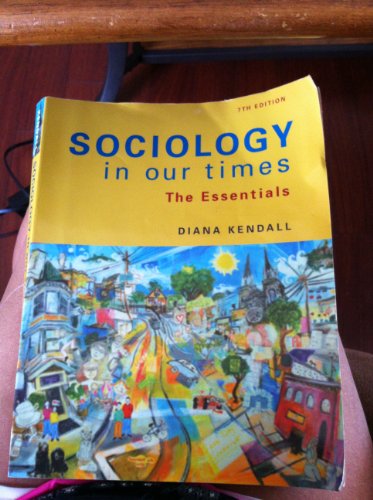Have you ever wondered why people behave the way they do? Why do social movements emerge, why do certain groups experience more success than others, and why do cultural trends change so rapidly? The answers lie within the realm of sociology, a discipline that offers a lens through which we can understand the intricate tapestry of human interaction and social structures.

Image: www.abebooks.com
Sociology, in its essence, is the scientific study of society. It delves into the complexities of human behavior, social groups, institutions, and their interactions. Unlike psychology, which focuses on the individual, sociology investigates the broader societal forces shaping our lives – from our families to our workplaces, from our political systems to our globalized world. Understanding these forces is crucial because they shape our beliefs, values, and even our identities.
What Is the Significance of Sociology in Our Times?
In a world increasingly defined by globalization, technological advancements, and social upheavals, sociology becomes more relevant than ever. It provides a framework for comprehending the changing dynamics of our societies and the challenges we face. By studying social patterns and exploring inequalities, power structures, and cultural shifts, sociology equips us with the tools to analyze, understand, and even shape our social reality.
A Historical Glimpse: The Roots of Sociology
The roots of sociology can be traced back to the 18th and 19th centuries, a time of significant social upheaval marked by the French Revolution and the Industrial Revolution. This era witnessed the birth of modern science and the rise of rational thought, prompting scholars to apply scientific methodologies to understanding society.
Key figures like Auguste Comte, credited with coining the term “sociology,” and Emile Durkheim, whose work on social solidarity and suicide remains pivotal, established the foundations of the discipline. These early sociologists emphasized the importance of social facts, objective phenomena that can be observed and analyzed, to explain social life.
Key Concepts in Sociology
Sociology is a vast field with a plethora of theoretical frameworks and concepts. Here are some foundational concepts that provide a fundamental understanding of the discipline:

Image: favpng.com
1. Social Structures: The Building Blocks of Society
Social structures refer to patterned social arrangements that shape our behaviors and interactions. They encompass institutions like family, education, religion, and the economy, and they create the framework within which we live our lives. Social structures are not static; they evolve over time, influenced by social change, technological developments, and cultural shifts.
2. Socialization: Learning the Rules of the Game
Socialization is the lifelong process through which individuals acquire the knowledge, values, beliefs, and behaviors necessary to function as members of a society. It occurs through interaction with family, peers, schools, and other institutions. Socialization allows us to learn the norms, expectations, and cultural scripts that define our society, ensuring social order and continuity.
3. Social Roles: Performing Our Parts in Society
Social roles are sets of expectations and behaviors associated with particular positions within a social structure. For instance, the role of a teacher involves specific responsibilities, expectations, and behaviors. Understanding social roles helps us navigate social interactions and understand the diverse ways individuals contribute to society.
4. Social Inequality: The Uneven Distribution of Resources
Social inequality refers to the uneven distribution of power, wealth, status, and opportunities within a society. It manifests in various forms, including class inequality, racial discrimination, gender disparities, and inequalities based on sexual orientation.
5. Social Change: The Dynamics of Transformation
Social change encompasses the alterations in social structures, institutions, and behaviors over time. It can be gradual or abrupt, driven by factors such as technological advancements, social movements, political ideologies, and economic shifts. Understanding social change is crucial for navigating the evolving dynamics of our societies.
Applications of Sociology in Our Times
Sociology’s relevance goes beyond academic theories and extends to a wide range of practical applications. Here are some examples:
1. Social Policy and Public Health
Sociological research informs the development of social policies and public health initiatives. By analyzing social factors that contribute to poverty, crime, and health disparities, sociologists help shape policies that address these issues. They can provide insights into the effectiveness of social programs and the impact of different interventions.
2. Business and Marketing
Sociology plays a crucial role in understanding consumer behavior, social trends, and market segmentation. Market research companies use sociological insights to develop targeted marketing campaigns and predict consumer preferences. Understanding social dynamics can also inform business strategies for navigating diverse cultural contexts and engaging with stakeholders.
3. Education and Community Development
Sociological studies help schools address issues of educational inequality, improve teaching practices, and create inclusive learning environments. Sociologists also contribute to community development initiatives by analyzing social problems and developing programs to address poverty, unemployment, and social isolation.
4. International Relations and Global Challenges
Sociology provides frameworks for understanding global issues like migration, conflict, and development. By analyzing social factors that contribute to these challenges, sociologists offer insights into potential solutions and strategies for building more equitable and sustainable societies.
Trends in Sociology Today
Modern sociology is characterized by a diverse array of research areas and theoretical perspectives. Several key trends are shaping the discipline today:
1. The Rise of Digital Sociology
The advent of digital technologies and online platforms has generated a wealth of new data for sociological analysis. Digital sociology explores how technology shapes social interactions, relationships, and the spread of information. It investigates the role of social media in influencing public opinion, political discourse, and social movements.
2. Intersectional Approaches to Social Inequality
Sociologists are increasingly employing intersectional approaches to understanding social inequality. This perspective highlights how multiple forms of oppression, such as race, gender, class, and sexual orientation, intersect and reinforce each other, creating complex forms of disadvantage.
3. Globalization and Transnationalism
Globalization has intensified the interconnectedness of societies and created new challenges for sociology. Transnational studies explore how social processes transcend national boundaries and the dynamics of migration, cultural exchange, and global inequalities.
4. Environmental Sociology
Environmental sociology examines the complex relationship between society and the environment. It studies how social structures, values, and beliefs influence environmental practices, and how environmental issues, such as climate change, impact social relations and inequalities.
Sociology In Our Times: The Essentials
https://youtube.com/watch?v=9ui6ZDTolTo
Conclusion: The Importance of Sociology in Our Times
Sociology, as a discipline, offers invaluable tools for understanding the complexities of our social world. By providing frameworks for analyzing social patterns, power structures, and cultural shifts, sociology equips us with the knowledge and insights to navigate the challenges and opportunities of our times. From shaping social policies to informing business strategies, sociology’s relevance extends beyond academia and into numerous facets of our lives. As we continue to grapple with global challenges, technological advancements, and social transformations, the insights provided by sociology become increasingly crucial for building a more just and sustainable future.





